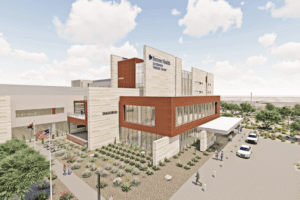At its Annual Meeting, the American Association for Cancer Research (AACR) announced that a scientific paper describing potential drug targets following the unprecedented genomic sequencing of 14 metastatic triple-negative breast cancer patients was the most cited study in 2013 of any published that year by AACR’s journal Molecular Cancer Therapeutics.
In the study, genomic sequencing – spelling out the billions of pieces of genetic information in an individual patient’s DNA – revealed therapeutic drug targets for difficult-to-treat, metastatic triple-negative breast cancer (TNBC).
The Translational Genomics Research Institue (TGen), Baylor University Medical Center and US Oncology Research investigators found significant recurring mutations and other changes in more than a dozen genes in patients treated at Baylor University Medical Center at Dallas. In addition, the investigators identified mutations previously unseen in metastatic TNBC and took the sequencing data into account in selection of therapeutic protocols specific to each patient’s genetic profile.
“The nature of this disease cried out for innovative research techniques such as whole genome sequencing coupled with new tools for data analysis,” said Dr. David Craig, Ph.D., TGen’s Deputy Director of Bioinformatics, one of the study’s co-lead authors.
The most frequently mutated gene among the tumors was the TP53 tumor suppressor, and aberrations were observed in additional tumor suppressor genes including CTNNA1, which was detected in two of six African American patients. Alterations were also seen in the ERBB4 gene, known to be involved in mammary-gland maturation during pregnancy and lactation, but not previously linked to metastatic TNBC.
Each tumor was genomically unique, but the majority contained alterations in one or both of the RAS/RAF/MEK/ERK and PI3K/AKT/MTOR pathways. Targeted therapeutic intervention aimed at these pathways achieved antitumor responses in several cases.
“The fact that this study has been cited more often than any other in Molecular Cancer Therapeutics that year is a testament to strong interest the oncology community has in understanding the molecular basis of metastatic TNBC, and in the hypothesis that targeting specific mutations in patients’ TNBCs will improve patients’ outcomes,” said Joyce O’Shaughnessy, M.D., the study’s other co-lead author. Dr. O’Shaughnessy is the Celebrating Women Chair of Breast Cancer Research at Baylor University Medical Center at Dallas, Chair of the US Oncology Network’s Breast Cancer Program, and a practicing oncologist with Texas Oncology.
Metastatic TNBC is a highly aggressive form of breast cancer that does not express the estrogen receptor, progesterone receptor or HER-2, the biomarkers successfully targeted in most breast cancers.
Metastatic TNBC has a poor prognosis with a median survival rate among metastatic patients of only one year. While TNBC accounts for only about 15 percent of all breast cancers, its more aggressive biology makes it responsible for nearly one in four deaths related to this disease.
“This study continues to stand as a great example of molecular medicine in practice. The results have provided novel and interesting clues into breast cancer biology and into the promise and challenges of precision medicine,” said Dr. John Carpten, Ph.D., TGen’s Deputy Director of Basic Science, Director of TGen’s Integrated Cancer Genomics Division, and the study’s senior author.
The study, “Genome and transcriptome sequencing in prospective triple negative breast cancer uncovers therapeutic vulnerabilities,” was conducted by the Translational Genomics Research Institute (TGen) and US Oncology Research with support from Life Technologies Corporation.
Molecular Cancer Therapeutics is one of several peer-reviewed scientific journals published by the 35,000-member American Association for Cancer Research (AACR), the oldest and largest scientific organization in the world focused on every aspect of high-quality, innovative cancer research. The programs and services of the AACR foster the exchange of knowledge and new ideas among scientists dedicated to cancer research, provide training opportunities for the next generation of cancer researchers, and increase public understanding of cancer.




